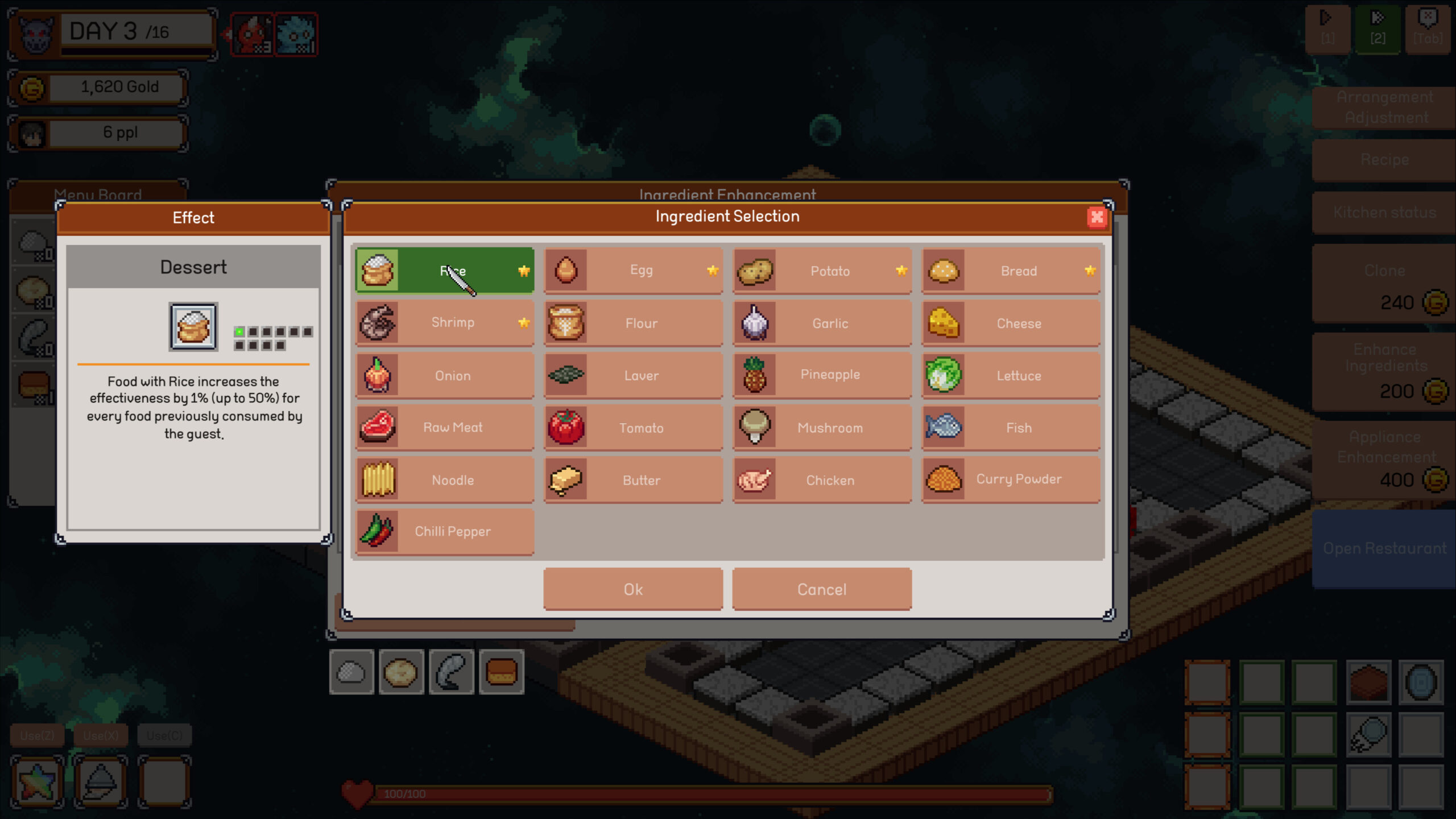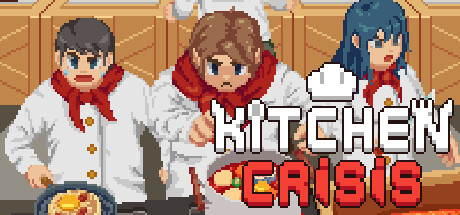Kitchen Crisis — Preliminary Review
Author: GamerFan | Release Date: April 2, 2024
Overview
Kitchen Crisis is a small but ambitious indie that mixes tower defense, roguelike progression, and cooking puzzles. You are abducted by hungry aliens and must survive by building, arranging, and upgrading a kitchen that produces the recipes they demand. The game is cute and chaotic, yet it thrives on systems. Appliance placement, recipe order, ingredient upgrades, and character traits all combine into a puzzle of efficiency.
Story & Setting
The premise is absurd yet fun: you wake up on an alien ship and learn that the only way to live is by feeding your captors. Story beats are light and mainly frame the gameplay. There are character interactions, flavor text, and situational quirks depending on alien environments. However, Kitchen Crisis is mostly a systems-first game. The setting also allows the developers to add strange recipes and playful environments. As a result, the tone stays light while the goal remains clear—design a better kitchen than before.
Core Gameplay Mechanics
At its heart, Kitchen Crisis offers an automated cooking loop with spatial strategy:
- Automated Cooking: Characters follow recipes without direct control. Once the kitchen is set up, the system runs itself. Success often depends on preparation before the round begins.
- Appliance Arrangement: Efficiency relies on placement. Paths, proximity, and flow matter. A smart layout reduces downtime and prevents costly pauses.
- Recipe Difficulty & Effects: Harder recipes bring stronger effects but raise difficulty. Choosing them becomes a risk/reward decision that shapes each run.
- Upgrades & Builds: Gold lets you upgrade appliances, ingredients, and systems. Synergies define your playstyle and become vital in later stages.
- Characters & Traits: Each character has unique strengths and flaws. Some kitchens or recipes work better with specific characters, which pushes you to adapt.
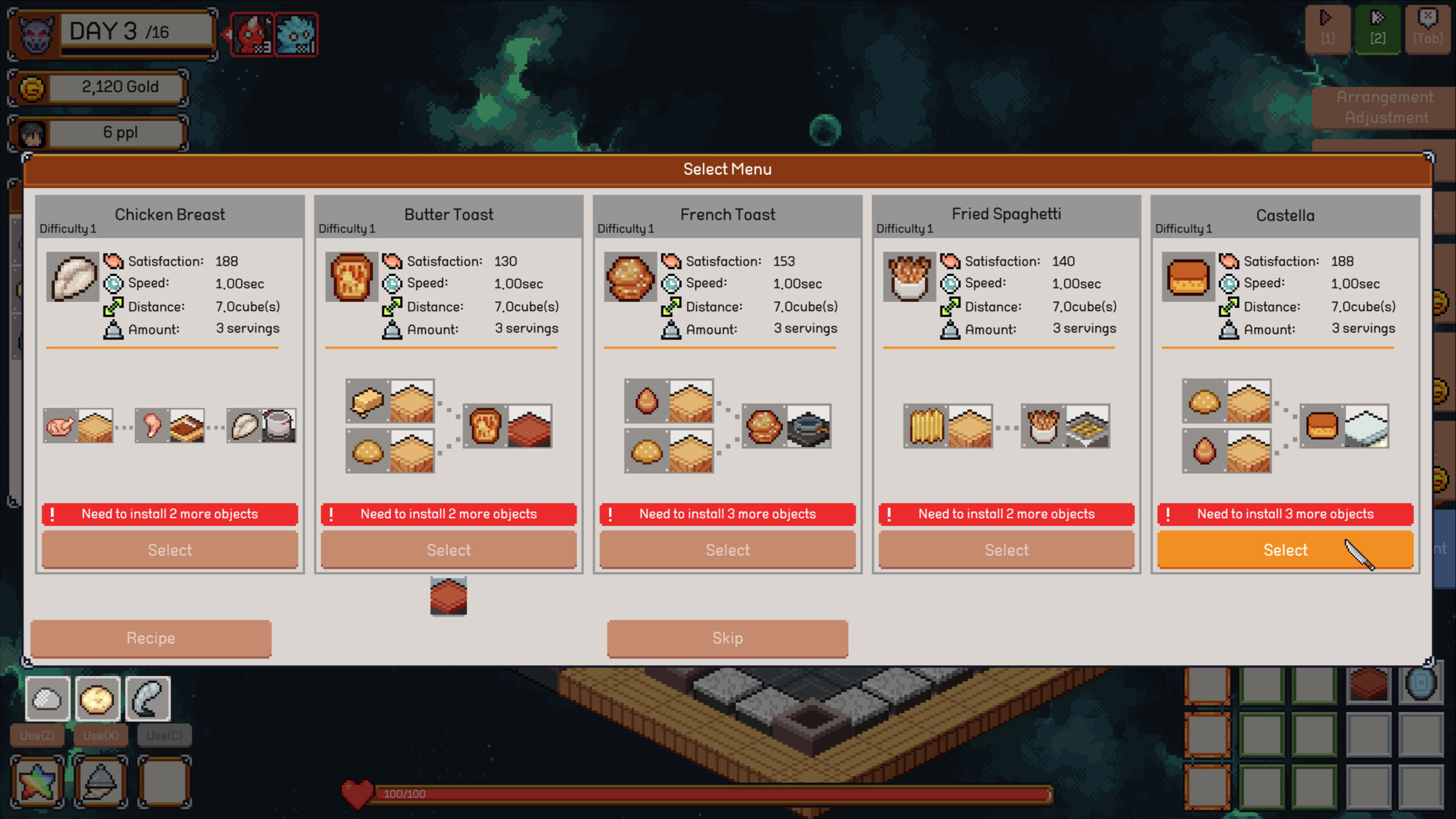
Progression, Difficulty & Replayability
Kitchen Crisis belongs firmly in roguelite territory. Each run depends on the recipes you face, the upgrades you select, and the kitchen layout you build. This structure fuels the classic “one more try” loop. Runs are short, yet progression is steady, which encourages experimentation.
Difficulty rises with complex recipes and new environmental rules. This escalation shines for players who enjoy optimization puzzles. Still, it can create sharp spikes that feel punishing if your build lacks synergy. The deckbuilding and upgrade system adds replay value. However, enjoyment depends on whether you prefer automated pacing or direct control.
Visuals & Audio
Kitchen Crisis uses charming isometric pixel art. The style is clear and readable, even during chaos. Appliances, ingredients, and dishes remain distinct, while alien designs balance whimsy and unease. Animation is simple but effective. Steam, sizzles, and idle motions add life to the ship’s halls.
The soundtrack leans on upbeat chiptune and electronic tracks that fit the theme. Sound effects, like chimes, ticks, and alien burps, communicate states clearly. The game avoids cinematic audio but delivers charm and clarity. That is all it needs.
Community Reception & Review Summary
As of this preliminary look, Kitchen Crisis has an “Mostly Positive” all-time rating on its storefront with 75% positive from 305 reviews. Recent reviews are listed as N/A, suggesting either sparse recent coverage or moderation in the review feed. The community reaction highlights a few recurring themes:
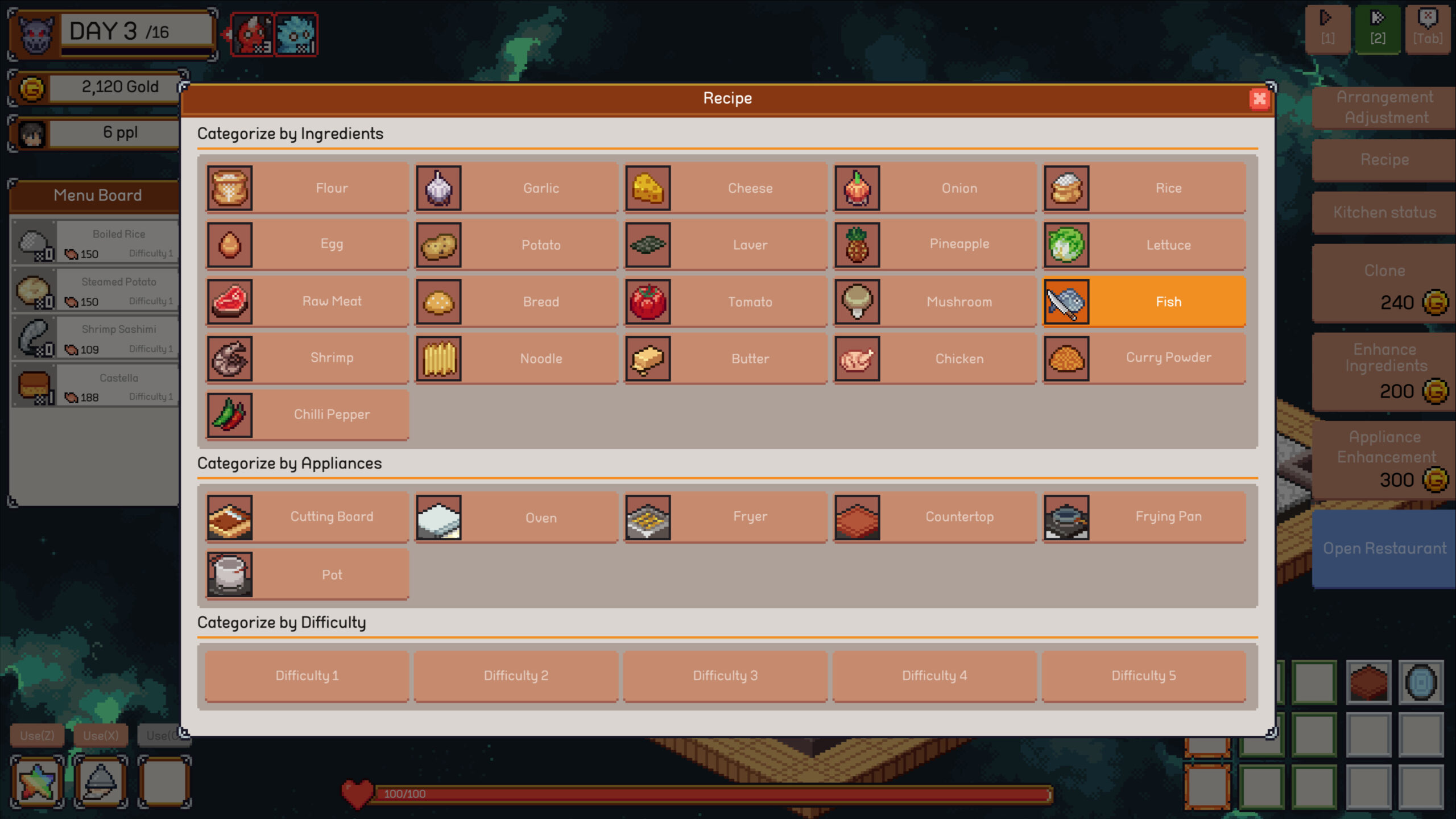
- Praises: Players frequently applaud the core hook—arranging kitchens and watching optimized automation in action is uniquely satisfying. The pixel art, humor, and variety of recipes/characters earn consistent praise. Many reviewers cite a strong roguelite loop that encourages experimentation with different builds.
- Criticisms: Common complaints focus on balance and pacing. Some players report abrupt difficulty spikes tied to certain recipe combinations or environmental hazards. Others feel the automation reduces agency—when things go wrong it can be hard to recover mid-run because direct intervention is limited. A handful of users note UI clarity and tutorial depth could be improved, especially for players new to layout-centric strategy.
- Overall Impression from Reviews: The 75% positive score suggests a solid, well-liked game with room to improve. The consensus: Kitchen Crisis is delightful when its systems click together, but it can be frustrating when randomness or balance issues negate the careful planning the game asks of you.
Strengths
- Unique genre hybrid—tower defense + roguelite + automation—keeps gameplay fresh.
- Highly satisfying optimization loop for players who enjoy spatial puzzles and throughput management.
- Charming isometric pixel art and playful audio design add personality.
- Varied characters and recipes promote experimentation and replayability.
- Moddable tag hints at community-driven longevity and creative expansion.
Weaknesses
- Occasional balance and difficulty spikes can feel punishing without clear counters.
- Automation reduces direct player control; recovery options mid-run are limited.
- Tutorial and UI could be more explicit for newcomers to layout-based strategy.
- Recent review data is sparse, and some players report small bugs and polish issues typical of ambitious indies.
Industry Impact & Context
Kitchen Crisis is an example of a trend in indie development: genre mashups that take established systems (roguelite meta progression, tower-defense waves) and apply them to a novel setting. By putting automation and spatial arrangement at the center rather than direct action, the game highlights design space that other studios may explore further—think automation-focused puzzles in more narrative-driven shells or deeper deckbuilding synergy with layout mechanics.
Its moddable label is also important; if the community embraces mod tools, Kitchen Crisis could evolve into a platform for new recipes, appliances, and balance patches, extending its lifespan and influence among indie designers interested in player-driven content.
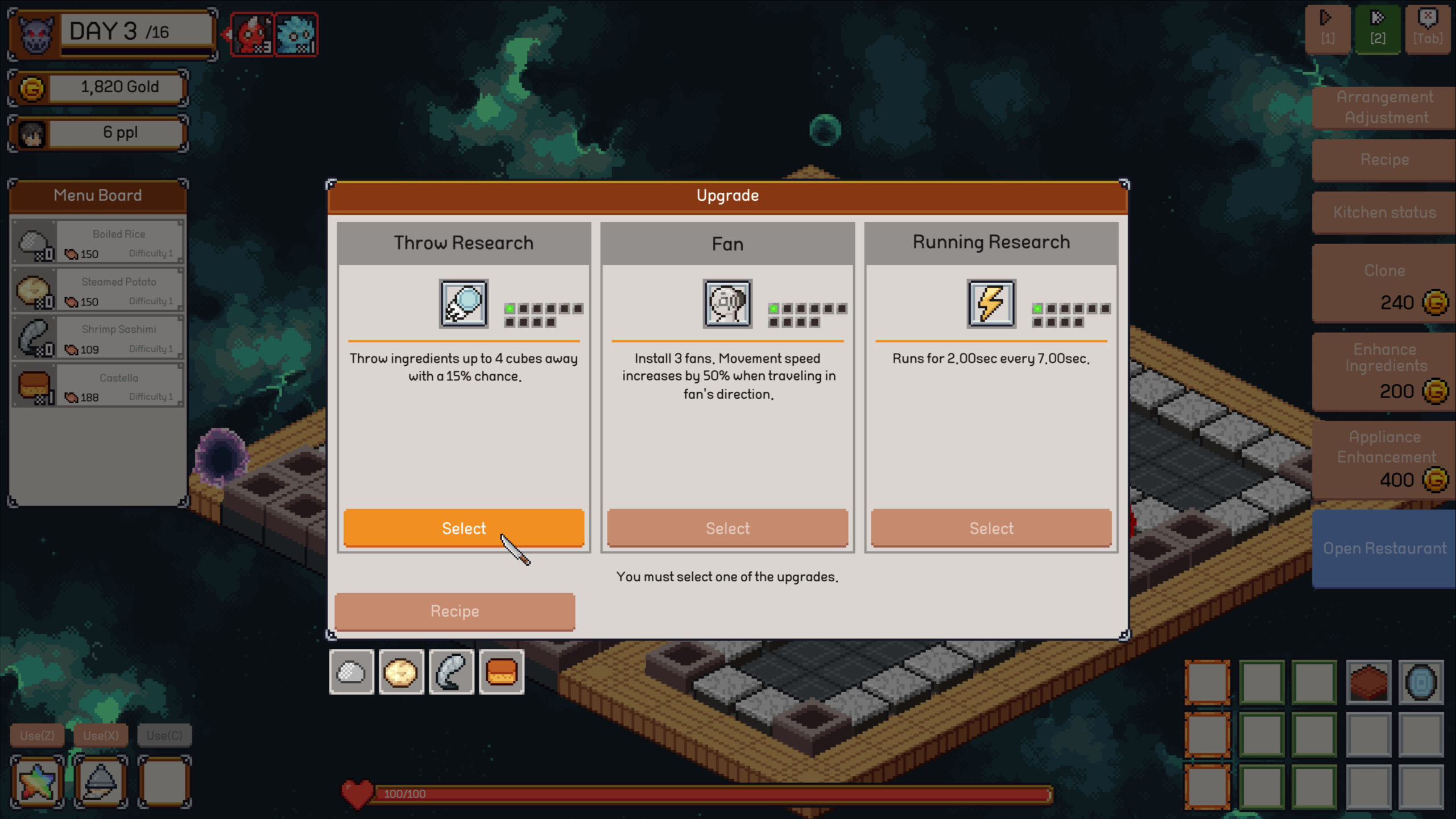
Who Will Enjoy Kitchen Crisis?
- Fans of roguelites who like incremental progression and buildcraft.
- Players who enjoy puzzle-like optimization and spatial problem-solving.
- Those who appreciate cute pixel aesthetics and tongue-in-cheek sci-fi premises.
Less recommended for players who prefer direct, twitch-based control or those who dislike randomness heavily impacting outcomes.
Verdict & Recommendations
Kitchen Crisis is a smart, charming experiment that succeeds most when the systems align: clever layouts, synergistic upgrades, and the right recipe mix create deeply satisfying runs. The 75% “Mostly Positive” review consensus reflects a game that delights many but frustrates some—particularly with balance and agency concerns. With a few quality-of-life improvements (clearer tutorials, more recovery mechanics mid-run, and balance patches), Kitchen Crisis could be a standout indie that influences future automation-focused designs.
If you love methodical optimization, cute pixel art, and a roguelite that rewards planning over reflexes, Kitchen Crisis is worth your time. If you prefer direct control or hate feeling at the mercy of random recipe draws, approach with caution—or wait until further updates smooth the rough edges identified by the community.
Quick Game Info
- All-Time Reviews: Mostly Positive (75% of 305)
- Recent Reviews: N/A
